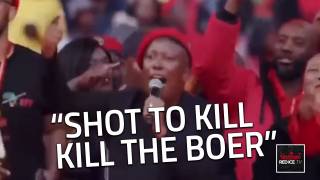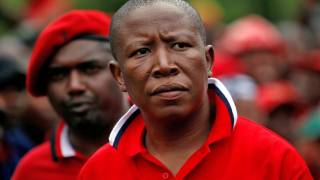South Africa Nearing the Point of No Return
Gregory Hood, American Renaissance, 20 February 2018
For those ostensibly interested in building a multiracial democracy, the recent history of Zimbabwe should be a warning, not a model. However, South Africa appears poised to follow its northern neighbor’s disastrous policies of land confiscation and white scapegoating, accelerating the former First World nation’s decline. International observers are cheered by the departure of the “Rainbow Nation’s” famously corrupt president Jacob Zuma, but the new South African President, Cyril Ramaphosa, faces the all but impossible task of repairing the country’s crumbling economy while appeasing a black electorate that wants to seize white farmland.
President Ramaphosa, leader of South Africa’s dominant African National Congress (ANC), is taking office with sky-high expectations from both South Africans and the international community. However, there has been so much economic damage from Mr. Zuma’s administration that both S&P Global and Fitch have downgraded South Africa’s long term debt to “junk,” and Moody’s has put the country on review. If Moody’s follows S&P and Fitch, South Africa’s government will have to spend more on debt payments, and investment capital would flee the country, making it even more difficult to fund social programs. South Africa’s finance minister (who is seen as a Zuma loyalist and whose job is in doubt) says repairing South Africa’s credit rating will be a top priority for the new government.
The markets are responding positively to Mr. Ramaphosa’s inauguration; the rand increased in value and stocks soared after Mr. Zuma was forced out. Optimistic press reports claim South Africa is ready to “explode” economically. Also, racial tensions are said to be exaggerated, since Mr. Zuma failed in his attempt to cling to power by blaming white people. South Africa’s legal process functioned as it should, and Mr. Zuma was forced out peacefully, despite fears he was going to use militant tactics to stay in power. Since Mr. Ramaphosa’s main priorities are economic, he hardly sounds like a radical.
Nevertheless, Mr. Ramaphosa’s margin for maneuver is far narrower than enthusiastic coverage would suggest. While trying to calm international markets, he has also called for confronting “inequality,” a question that in South Africa carries major racial overtones. He will find it hard to do both.
First, more than anything else, Mr. Ramaphosa has to tackle the problems of corruption and mismanagement in state-owned companies, problems that got worse under Mr. Zuma. Mr. Zuma built his power on a network of patronage and political obligations, and rooting out his loyalists will take time. It is also likely to be divisive for the already fragmented ANC, since Mr. Zuma still has supporters, especially in his stronghold of KwaZulu-Natal. Mr. Zuma is reported to have had corrupt partnerships with the Guptas—an Indian immigrant family with a huge holdings in South Africa’s resources—and his upcoming trial will only heighten tensions within the ANC.
The very trait that makes Mr. Ramaphosa attractive to foreign investors—his perceived friendliness to the free market—also opens up a line of attack for his opponents inside and outside the ANC. Mr. Ramaphosa is, by South African standards, soft on the question of race and redistribution of wealth. The main division is around the term “white monopoly capital.” Mr. Zuma and his allies wanted the term, with its explicit racial identification, designated in party propaganda as an enemy to be fought. Mr. Ramaphosa argued that the term, which once formed part of the ANC’s revolutionary lexicon, should be left in the past. Others still use such language. For example, Jacob Zuma’s son Edward, even while calling for party unity behind Mr. Ramaphosa, declared his father’s fall a victory for “white monopoly capital and the Western agents who are hell-bent on destroying our country.”
Julius Malema of the leftist Economic Freedom Fighters (EFF) party has vowed to give Mr. Ramaphosa even more trouble than he gave Mr. Zuma. He recirculated reports of Mr. Ramaphosa’s involvement in a massacre of striking mine workers in 2012 and reportedly said that he “wanted to show white capitalists that Ramaphosa will not save them.” Since Mr. Malema is already blasting Mr. Ramaphosa for having “no plan,” the new president will be under pressure to act quickly. While the EFF has a small political following compared to that of the ANC, the fact Mr. Malema is a former head of the ANC Youth League shows the potential for the ANC to splinter on questions of economic redistribution and race.
Mr. Malema is already finding something to cheer about, since Mr. Ramaphosa has declared his support for a program of taking land without compensation. This would seem to conflict with his promise to increase economic growth and attract foreign investment. Foreign capital shies away from countries where it can be seized without recompense, but Mr. Ramaphosa probably felt he had to offer the Left something. However, he suggests farmland should be taken only in a way that “increases agricultural production, improves food security.” It is not clear how this can be done.
Read the entire article at American Renaissance.






















